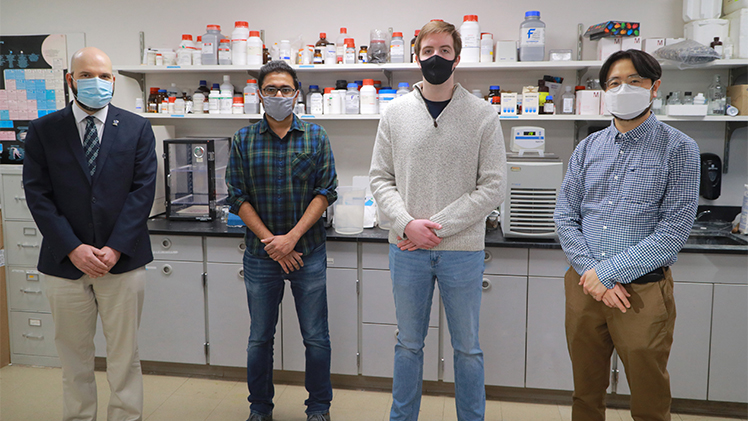The U.S. Environmental Protection Agency awarded The University of Toledo a one-year, $24,985 grant for a sustainable wastewater management project led by engineering students to design wet wipes that rapidly dissolve into regular wet toilet paper when flushed.
UToledo is one of 32 student teams the EPA chose to fund as part of its 17th Annual P3 Awards: A National Student Design Competition Focusing on People, Prosperity and the Planet to develop and demonstrate projects that help address environmental and public health challenges.

From left to right, Dr. Yakov Lapitsky, professor of chemical engineering; Kunal Choudhuri, a chemical engineering Ph.D. student; Reece Kendall, an undergraduate chemical engineering student; and Dr. Youngwoo Seo, professor of civil, environmental and chemical engineering.
“Advancements in scientific knowledge and technology come from innovative projects like these,” said EPA Regional Administrator Kurt Thiede.
Reece Kendall, an undergraduate chemical engineering student; Kunal Choudhuri, a chemical engineering Ph.D. student; and Michael Griffin, an undergraduate student in environmental engineering, are working on the project with Dr. Yakov Lapitsky, professor of chemical engineering, and Dr. Youngwoo Seo, professor of civil, environmental and chemical engineering.
“Wet wipes – even those marketed as ‘flushable’ – clog pipes and pumps in sewer and wastewater treatment systems when flushed down the toilet and, thus, damage or interfere with the operation of wastewater collection and treatment facilities,” Lapitsky said. “Many of these wipes also contain synthetic polymers, which, even when these wipes disperse, pollute the water with microplastic fibers.”
The team will develop wet wipes that, upon flushing, turn into regular toilet paper, and fully circumvent the need for non-biobased polymers or microplastics. The team plans to alter the matrix of regular, commercial toilet paper with self-assembled surfactant and biopolymer complexes.
Kendall and Choudhuri, both students in Lapitsky’s lab, will use molecular self-assembly principles to design the materials.
Griffin will then use microbiological techniques in Seo’s lab to test whether the degradation products from these wipes have any adverse effects on wastewater bioreactor performance.
“Wet wipes like these could improve sanitation and human health, reduce the cost of repairing pipes clogged at home and businesses as well as municipal infrastructure, and decrease pollution by safeguarding sewer and wastewater treatment systems and reducing the emission of plastic debris,” Choudhuri said.
The EPA’s P3 program is a two-phase research grants program that challenges students to research, develop and design innovative projects addressing environmental and public health challenges. Phase I serves as a “proof of concept,” where teams are awarded a grant to develop their idea and showcase their research in the spring at EPA’s National Student Design Expo. These teams are then eligible to compete for a Phase II grant of up to $100,000 to implement their design in a real-world setting.
“As EPA celebrates its 50th anniversary, this month we are highlighting ways the agency supports the next generation of environmental leaders,” said Jennifer Orme-Zavaleta, principal deputy assistant administrator for science and EPA science advisor. “The P3 program helps foster environmental education among students to support the next generation of scientists and engineers working to tackle some of today’s most pressing environmental issues.”